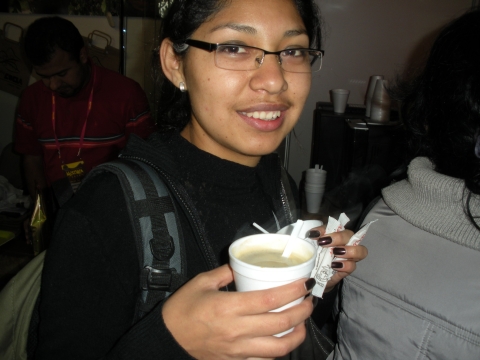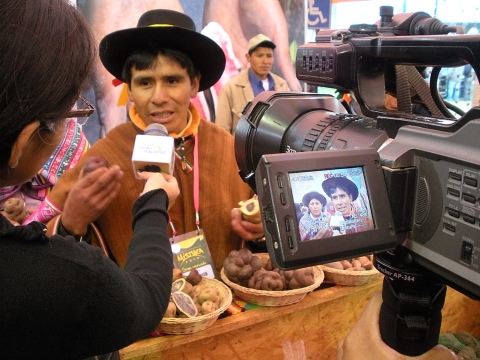
Reporter Gina Carbajal tries the world's best coffee.

The Yana Piña, or Mother-in Law Potato
Thousands of potatoes, the world's best coffee, and the secret to getting married take center stage at Peru's largest food festival.
Finding a boyfriend and getting married in Peru must be pretty difficult. That is if you follow the tradition behind the Yana Piña potato, also known as the "Mother-in-Law Potato." According to tradition, before a girl can get married she needs to prove her love- and worth- to her future mother-in-law by peeling this grenade-looking thing... all in ONE strip!!
The Yana Piña, or Mother-in Law Potato
The Yana Piña is just one of the more than 4,000 varieties of potatoes grown in Peru. There is even an International Potato Center just outside of Lima which conducts research on potato, sweet potato, and tuber crops. Knight Fellow Ross Settles (Malaysia) introduced me to one of his friends from graduate school who runs the Center´s media department. At first her excitement about potatoes was a bit odd; however, she is the best ambassador, and I am now a convert. My name is Hena Cuevas, and I am a potatoholic.
The papa nativa, which Peru is actively promoting, occupied center stage at the Mistura Food Festival. This is the third year for the event which showcases the cuisine of 14 regions in Peru. More than 30 of the best restaurants prepare their signature dishes, becoming the perfect opportunity for many Peruvians to taste some traditional treats, as well as letting them try some of the expensive fusion creations which are rapidly earning a place for Peru at the top of the world gastronomic map.
The Yana Piña, or Mother-in Law Potato
The festival has quickly been growing in popularity. The first day alone there were 17,000 people, and over 200,000 were expected to attend the five day event! This meant that getting tickets was nearly impossible, and scalpers were demanding three times face value. So, I tagged along with one of the crews from Enlace Nacional, the national newscast of partner association TV Cultura. Nothing like a press pass to open the door.
Since Enlace Nacional is a national program, their stories are about issues you wouldn’t normally see on Lima’s local news so the crew focused on the smaller booths, featuring regional cuisines... the kinds of stories their affiliates would be interested in. For example, reporter Gina Carbajal interviewed the farmer who’s getting honored by the government for being one of the biggest promoters of the papa nativa.
And they also profiled Café Tunki - produced by another small indigenous farmer - which just won the title of the world’s best organic coffee. Sorry Colombia. A pound of Café Tunki now sells for about $12 in the U.S.
The Yana Piña, or Mother-in Law Potato